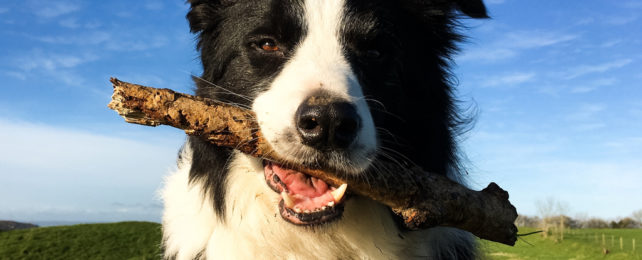There's a very special and very rare group of dogs known as Gifted Word Learners by researchers, and they have a particular talent: being able to learn the names of multiple toys.
They learn these names quickly and remember them for months.
In a new study, experts wanted to see whether these Gifted Word Learners – and there are very few worldwide – had any special personality traits compared with the rest of the pooches out there.
As it turns out, they do: in an analysis of 21 gifted dogs and 144 typical dogs that don't have the unusual ability to learn multiple object names, it was found that the gifted dogs were rated by their owners as more playful than the other dogs.
"This study shows that there is a relationship between extremely high levels of playfulness and giftedness in learning object verbal labels in dogs," says ethologist Ádám Miklósi, from Eötvös Loránd University in Hungary.
Border Collies were used for this study because most of the Gifted Word Learners are of that breed (though it's not true that most Border Collies are gifted). Border Collies are also working dogs, known to already be more playful than non-working breeds.
Based on questionnaires filled out by the dog owners, playfulness was the only characteristic that the gifted dogs showed any difference in.
Interestingly, it's also been previously suggested that a defining trait in gifted humans is their openness to experience – a proxy for playfulness.
The team thinks the research can lead to more studies looking at the link between giftedness and personality. If you think that your canine shows this rare ability to remember the names of multiple items, you can even take part in the research.
One of the questions that could be looked into in the future is why exactly this correlation is there. Being gifted might be driving the playfulness, or the playfulness might be driving the learning – or perhaps it's somewhere in between.
When Gifted Word Learner dogs are shown to be able to remember the names of multiple items, it happens during playful social contexts. In other words, more playful dogs may also be given more opportunities to learn, because they're always playing.
What's more, playful dogs are known to make eye contact with humans faster. This is another trait that could lead to them getting extra opportunities to learn, because communication is established more quickly.
"Importantly, the positive association between playfulness and giftedness in object label learning could emerge in two rather different ways, which are not necessarily mutually exclusive," write the researchers in their published paper.
First, it's possible that some individual dogs have a genetic predisposition to playing around a lot, which the owners then encourage. Playful interactions become even more exaggerated and last longer.
Second, some Border Collie owners might be aware that the breed is known for playfulness, encouraging it no matter what the predisposition of the individual dog. Here, environmental factors (the owner) are what would encourage the exaggerated play.
The researchers put forward these contrasting hypotheses to show that further study will be required to understand whether playfulness is a result of dogs being more gifted, or the other way around.
"It is important to note that this [study] does not necessarily imply that playfulness is what makes this talent emerge," says Miklósi.
The research has been published in Animal Cognition.
